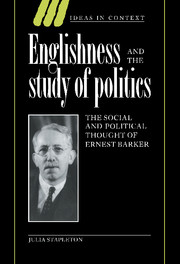Book contents
- Frontmatter
- Contents
- Acknowledgements
- Introduction: The ‘national character’ of Barker's thought
- 1 Lancashire, Idealism, and Whiggism: the making of an English political scientist
- 2 The polis, law, and the development of political studies at Oxford, 1900–1920
- 3 Society and the state in the English national past: the lure of Pluralism
- 4 Statehood, nationhood, and internationalism: English political theory and the First World War
- 5 Education and national character: the milieu of King's College London
- 6 ‘Continental’ political science and the Cambridge Chair
- 7 Traditions of civility: the construction of Englishness in the Second World War and beyond
- 8 The expansion of Englishness: the Books Commission, Europe, and the Commonwealth
- Conclusion: A late-Victorian liberal-conservative
- Select Bibliography
- Index
- Ideas in Context
7 - Traditions of civility: the construction of Englishness in the Second World War and beyond
Published online by Cambridge University Press: 11 September 2009
- Frontmatter
- Contents
- Acknowledgements
- Introduction: The ‘national character’ of Barker's thought
- 1 Lancashire, Idealism, and Whiggism: the making of an English political scientist
- 2 The polis, law, and the development of political studies at Oxford, 1900–1920
- 3 Society and the state in the English national past: the lure of Pluralism
- 4 Statehood, nationhood, and internationalism: English political theory and the First World War
- 5 Education and national character: the milieu of King's College London
- 6 ‘Continental’ political science and the Cambridge Chair
- 7 Traditions of civility: the construction of Englishness in the Second World War and beyond
- 8 The expansion of Englishness: the Books Commission, Europe, and the Commonwealth
- Conclusion: A late-Victorian liberal-conservative
- Select Bibliography
- Index
- Ideas in Context
Summary
PRIVATE AND PUBLIC ENGLISHNESS
While Barker had always construed his role as a teacher and writer in the broadest of terms, his retirement from the Cambridge Chair in 1939 opened up new and even richer possibilities for its enactment. This was largely on account of the fact that his retirement coincided with the outbreak of the Second World War. As he wrote to Jessica Brett Young, wife of the poet Francis Brett Young, in 1944, ‘It is one result of this war that it galvanises the spirits of us older men into activity which the body can hardly rise to.’ He quickly became a leading authority on English cultural identity in Britain, developing many of themes which he had touched upon in earlier years. This focus of his work was instrumental in securing him a wide readership, a ‘partial public’ to which he could bid farewell in his penultimate book.
A clear preoccupation with what one historian has termed ‘the Englishness of England’ had emerged in literary writing during the 1930s, not all of it elegiac. This gave all the appearance of ‘a nation in love with itself’, offsetting the harsh cultural dissent of the ‘Auden generation’ for which that decade is usually renowned. After the experience of Dunkirk in 1940, the idea of Englishness acquired still further emotional charge, playing a crucial role in maintaining a high level of civilian morale and eliciting the patriotism of English intellectuals across a wide range of the political spectrum.
- Type
- Chapter
- Information
- Englishness and the Study of PoliticsThe Social and Political Thought of Ernest Barker, pp. 154 - 176Publisher: Cambridge University PressPrint publication year: 1994



